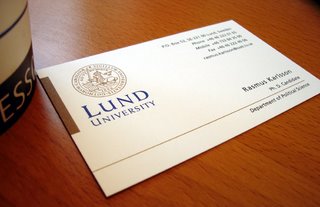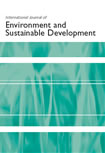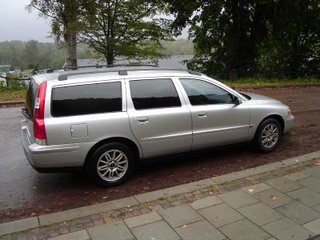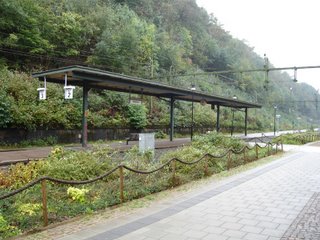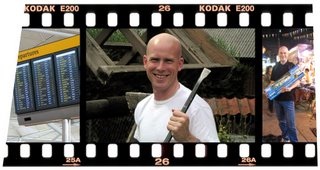Travelling north on one of the first morning services with X2000. As announced, I am on my way to Karlstad for the
annual meeting of the Swedish Political Science Association. There I will be discussant on a paper written by
Ronnie Hjorth, senior lecturer at Linköping University, and also present my own research.
Hjorth’s paper is on the concept of equality in international society. Working within the
English school of international relations theory, Hjorth explores the idea of equality between states through a historical literature survey. Clearly the principle of equality has for a long time been fundamental to both diplomatic practice and international law. Hjorth comes up with some fruitful analytic categories which illustrate how our understanding of equality between states has shifted from a natural and moral interpretation (as with Thomas Aquinas) to an interpretation which emphasizes the pragmatic and constructed nature of the concept.
One great thing with going to conferences is the challenge of having to comment on papers that are outside your own field. And though I can see many connections between Hjorth’s paper and for instance the debate on Rawls’s
The Law of Peoples, or more recently Simon Caney’s excellent
Justice Beyond Borders, his paper is still quite remote from what I normally do.
During the meeting in Karlstad I am also looking forward to meeting a few friends of mine. Marcus Ohlström, who now is a PhD candidate at Växjö University is coming and so is
Ed Page from the University of Warwick. Page, who has been on a Marie Curie Research Fellowship to Lund and who I also had the pleasure of meeting in Birmingham some time ago, has been a great source of inspiration to my own thinking. For those of you who do not know, it is worth mentioning that Page has recently finished his monograph
Climate Change, Justice and Future Generations which I can highly recommend.
Finally, I have to say something about the technology which makes this weblog-session possible. Currently, I am travelling close to 200 km/h aboard a Swedish high-speed train, enjoying a cup of coffee while surfing the Internet. It is cool.
 The flight down here from D.C. yesterday was spectacular, especially the last hours and the descent into Phoenix International Skyharbor. As we flew west, the quintessential American survey landscape was slowly transformed into red mountains, perfect circles of irrigation and fantasy mountains. Came to think of Corner and MacLean's book.
The flight down here from D.C. yesterday was spectacular, especially the last hours and the descent into Phoenix International Skyharbor. As we flew west, the quintessential American survey landscape was slowly transformed into red mountains, perfect circles of irrigation and fantasy mountains. Came to think of Corner and MacLean's book.


